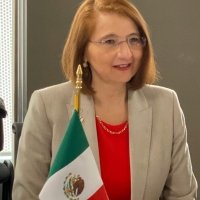The USMCA and the Future of Mexico's Trade Policy under AMLO
In this event, Luz María de la Mora, Mexico's Undersecretary for Foreign Trade, discussed the USMCA and future directions of Mexico's trade policy under AMLO.
The Andrés Manuel López Obrador administration maintains a focus on inclusive economic development and greater government involvement in driving economic growth. With an extensive network of free trade partners, Mexico is deeply integrated into global supply chains. Upon ratification by the three North American countries, the United States-Mexico-Canada Agreement, or USMCA, is set to replace the 25-year-old North American Free Trade Agreement (NAFTA). Additionally, on December 30, 2018, the Comprehensive and Progressive Agreement for Trans-Pacific Partnership, of which Mexico is a signatory, took effect, which will open up more markets to Mexican goods and allow the country to diversify its economic relations.
Luz María de la Mora currently serves as Undersecretary for Foreign Trade in Mexico's Secretariat of Economy. She is the founder of LMM Consulting and the Mexico chapter of Vital Voices Global Partnership. She has served as Undersecretary for Economic Relations and International Cooperation in Mexico's Secretariat of Foreign Affairs and as Assistant Undersecretary for International Trade Negotiations in Mexico's Secretariat of Economy. She headed Mexico's trade offices in Brussels and Montevideo, worked in the NAFTA office in Washington, DC, and was a Wilson Center Fellow. She has a B.A. in International Relations from El Colegio de México, an M.A. in International Political Economy from Carleton University, and a Ph.D. in Political Science from Yale University.
Selected Quotes
Luz María de la Mora
“We understand that trade is one of the most important engines of growth for Mexico, and we need to take care of trade. But we also need to improve the quality of our trade. And we need to make sure that trade is responsive to the needs of people. We need to find ways to include more sectors, to include more firms, to include more products, to include more regions into the value chains and into the international trade activity.”
“So now as result of this new agreement that we have in place- CPTPP, we have network of 13 free trade agreements with, basically, fifty countries in the world. Those countries are in North America, Europe, Latin America, but very importantly, Asia. We are very keen on strengthening our trade relations with Asia, the Asia Pacific, and we want to use the CPTPP to make this happen.”
“Mexico is not a national security threat to the U.S., Mexico is a partner to the U.S., Mexico is a source of competitiveness to the U.S. We understand that there is an overcapacity at the global level in terms of steel, but we also believe that we are stronger together as a region as opposed to imposing barriers among each other. And we really do not feel that’s the way to go…We want to be creative, we want to be part of the solution, and we believe that there will be solutions that can be explored through, for example, monitoring customs, border control, avoiding transshipment, etc.”
Introduction

Former Career Ambassador to Afghanistan, Argentina, and Mexico; Distinguished Diplomat in Residence, School of International Service, American University
Keynote Speaker

Former Undersecretary for Foreign Trade, Secretariat of Economy, Mexico
Moderator

Hosted By

Mexico Institute
The Mexico Institute seeks to improve understanding, communication, and cooperation between Mexico and the United States by promoting original research, encouraging public discussion, and proposing policy options for enhancing the bilateral relationship. A binational Advisory Board, chaired by Luis Téllez and Earl Anthony Wayne, oversees the work of the Mexico Institute. Read more
